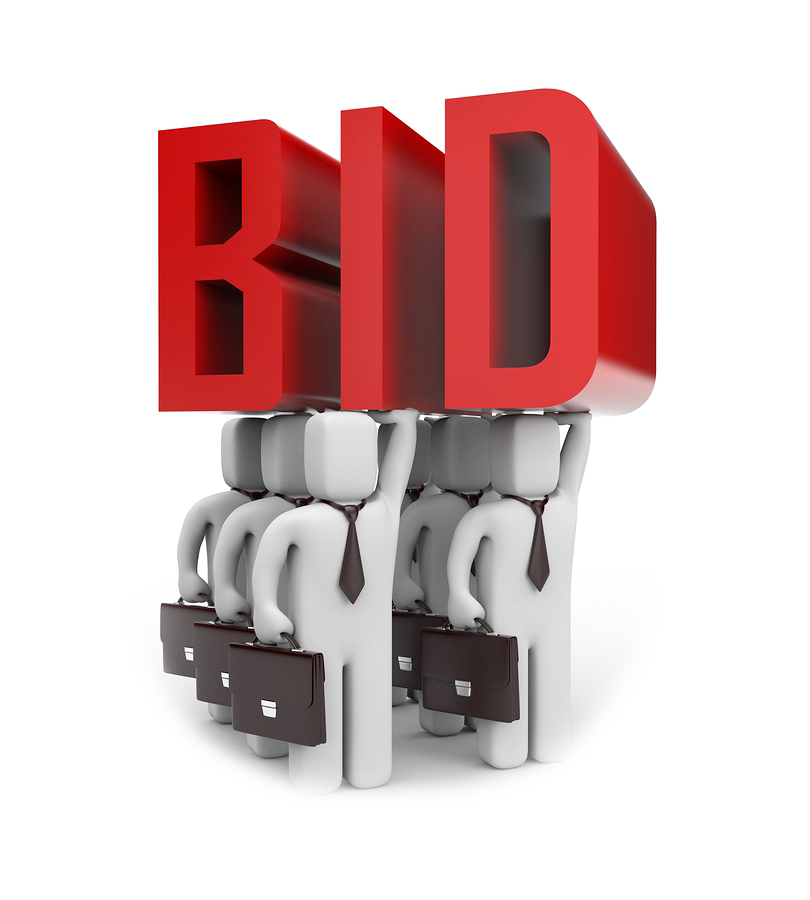When the first phone call comes, I get excited. I, like most of you reading this, have been a salesman at heart for most of my life. So, a request for 8,000 DVDs means I am making a sale, right? Not so fast. I, as a business owner, have learned how to stifle my salesman alter ego and wait for the purchase order before I get overly excited. Then again, my wife, as my business partner, implores me to wait until we get paid before I get excited. So I have learned in my nearly 50 year career… don’t get excited until “the fat lady pays” (not meant to offend anyone).

A few weeks ago, no less than eight calls and e-mails came in to our office within an hour. A few more requests followed the next day for 8,000 DVDs packaged just like retail. It is a job I could easily handle. As of this writing, I do not know if I, or anybody, got the bid. “Bid” is the key word for this column.
I sell only through distributors and have not violated that trust in 30 years. I am also brutally honest with those who regularly give me business. I will tell them they are being bid, but I won’t say by whom. I will counsel them and suggest ways they can get a competitive advantage, but not in the price I give them. Our playing field is always level. When you get a dozen requests for the same specifications, we, at Soundline, know it is an open bid… do they?
When I ask the distributor if he or she is aware it is a bid, more often than not, they are aware. My question is … if you know it is a bid, how often do you or should you chase after it? How much of your precious time should you allocate to the process of getting a bid? Do you want your company to be identified as a bidder and does that reflect on your credibility of being a creative source? Positioning yourself and company is more critical than ever.
Long ago, I put an embargo on my company giving a bid to a distributor who works with most U.S. state and local government bids. The paperwork is “humongous” and time after time we lost the bid to direct sources. Even the smallest margin added by my distributor made the price non-competitive. Even bids where the distributor and I agreed to let me do the billing and they take a small commission didn’t get us the business. So, I fired these opportunities once and for all. Sometimes you have to do that. In this most recent illustration, it was a casino and I knew I stood a slim chance. For many years, this very casino ordered a Christmas CD. They would pick a SONY or BMG album and put it out to bid. Then, they would buy it directly from SONY or BMG who own the property and are the sole source. It does not make sense, but they make the rules. Do you and I have to play by them?
Let’s turn to a more important issue with bidding. It is: what happens after you present a creative program, after you consult with your client, after you invest time and money in pursuing an opportunity and the client says, “I have to get three bids.” Perhaps you should have found that out when you interviewed your prospect on that very first encounter. Even if you did and still pursued the opportunity, is there any way of pre-empting this “commodification” of your business and value added services?
Yes, there is.
I have told you in previous columns that I am not a lawyer and that favorable conditions still exist, but we are going to tip toe through a legal arena now. Our business and creative services float somewhere in between the world of copyrights and industrial property rights. A unique design is much more definable and, as such, there is more protection. A creative concept is a hybrid, but also enjoys legal protection.
Protection from bids actually starts when you meet a client and when you respond to an opportunity. My advice… put it in writing. Submitting a sample for their consideration with a post it note won’t cut it. A paper trail is critical to any possible complaint you may have.
Let’s set the table. You have a creative concept for a client or prospect. It is a white “C” handle coffee mug. That’s a commodity and, if it were just the mug, it is doubtful that you can call that an idea for which you have intellectual rights. Your creative concept is to add an imprint inside, to add a package of coffee, to put a sleeve around it and put it into a red box with blue print. So, this is more complex than a simple mug. Is this idea something you can protect? Yes, but boy would it be costly to do. So, you write the proposal and the client buys in. Again, the buyer is required by internal policy to get a bid or two and you know that going in. If you want to spend your time and effort only to find a part-time distributor taking it away from you at a slim margin, then “woe is you.” Had you established your policy with the client at the outset, the result could be different and the deck stacked in your favor.
It goes like this:
 “Mrs. James, I understand that your company policy compels you to bid. All too often company policies negate the value our agency brings to you and it views our work together as a commodity product, not a creative promotional marketing campaign. You and I know the difference. Our agency gives you all our award-winning expertise free of charge. Unlike advertising agencies, we do the creative, the design, etc. in return for fulfilling the products and programs we propose. That is where our return on our investment with you is made.There are times our client will pay for our creativity, but that is not what I am suggesting here. We accept that you must bid, but we have something for your consideration. In return for all the creative ideas, the time and the cost we put in and in consideration of the fact that our intellectual property is being bid, we ask you for topping rights. What that means is that we agree to go along with your required bidding, but in exchange for what we have done, you give us topping rights. After you get your bids, we get the final opportunity to top your best bid and, if it is better, we are awarded the program.”
“Mrs. James, I understand that your company policy compels you to bid. All too often company policies negate the value our agency brings to you and it views our work together as a commodity product, not a creative promotional marketing campaign. You and I know the difference. Our agency gives you all our award-winning expertise free of charge. Unlike advertising agencies, we do the creative, the design, etc. in return for fulfilling the products and programs we propose. That is where our return on our investment with you is made.There are times our client will pay for our creativity, but that is not what I am suggesting here. We accept that you must bid, but we have something for your consideration. In return for all the creative ideas, the time and the cost we put in and in consideration of the fact that our intellectual property is being bid, we ask you for topping rights. What that means is that we agree to go along with your required bidding, but in exchange for what we have done, you give us topping rights. After you get your bids, we get the final opportunity to top your best bid and, if it is better, we are awarded the program.”
Is it legal? Check with your lawyer. Is it done? Yes! I was a publisher in the book business and it was done all the time. A new book by a popular author that was put out to bid often had topping rights given to the author’s most current publisher. Sports figures often test the market and return with those offers to the bargaining table with their current teams. You are not colluding on price. You are trading the rights to bid your intellectual property, so presented in a written proposal, and, if mailed, protection enough for you to file for a copyright, for the right to offer a better deal and be granted the order. Take a bit of time to digest the strategy. It is an approach that can help you decide if you are going to continue going after a client who requires bidding or not.
A million years ago, I visited the home office of a national hamburger chain in Florida with a distributor from Cleveland. We both had to sign a document that, if I had to take the time to read it, would make us late for our appointment upstairs. When I read what I signed on the plane trip home, I basically gave away the rights to the program and story boards I spent time and money on. Our program even included a new song, written for the prospect. What I agreed to by my signature was that, before I entered that door, I acknowledged and accepted that what I was proposing may have been proposed by another person or company, either in their employ, or an outside vendor like us. Sure enough, three or four years later a very similar program ran and we had no part in it. The bigger the fish, the more complicated the catch. Bidding a commodity that you had nothing to do with and are only responding to is far different than allowing your visions and dreams to be completed by someone else. Today, more than ever there is a bid mindset. There are internet sites for you to bid suppliers, for printers to bid on catalog printing, etc.
The take away is that you need to set the table. That your presentations become highly professional and are in writing. That you put a statement within your proposal stating the rights to the property are yours. That all of this needs to be laid out very early in your client relationship so that you both know each other’s rules and can live with them.
Joel D. Schaffer, MAS. is CEO and Founder of Soundline, LLC, the pioneering supplier to the promotional products industry of audio products. Joel has 48 years of promotional product industry experience and proudly heralds "I was a distributor." He has been on the advisory panel of the business and marketing department of St. John’s University in New York and is frequent speaker at Rutgers Graduate School of Business. He is an industry Advocate and has appeared before the American Bankers Association, American Marketing Association, National Premium Sales Executives, American Booksellers Association and several other major groups. He has been a management consultant to organizations such as The College Board and helped many suppliers enter this industry. He is a frequent contributor to PPB and Counselor Magazines. He has facilitated over 200 classes sharing his industry knowledge nationwide. He is known for his cutting humor and enthusiasm in presenting provocative and motivating programs. He is the only person to have received both the Marvin Spike Industry Lifetime Achievement Award (2002) and PPAI’s Distinguished Service Award (2011). He is a past director of PPAI and has chaired several PPAI committees and task forces. He is a past Chair of the SAAGNY Foundation, Past President of SAAGNY and a SAAGNY Hall of Fame member. He was cited by ASI as one of the 50 most influential people in the industry.